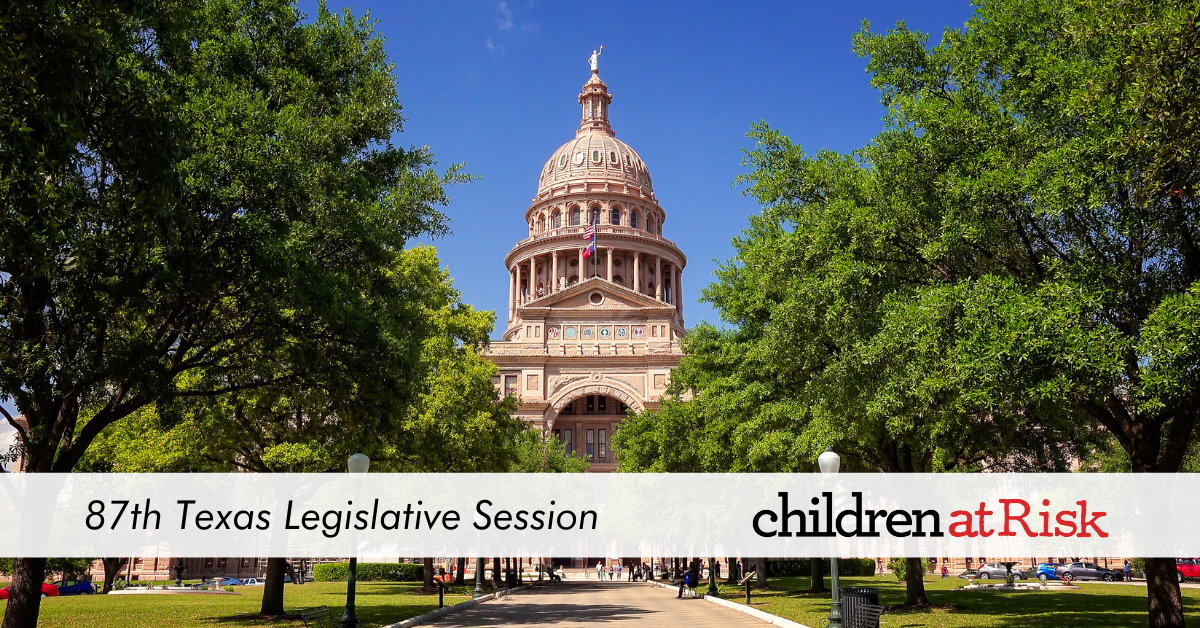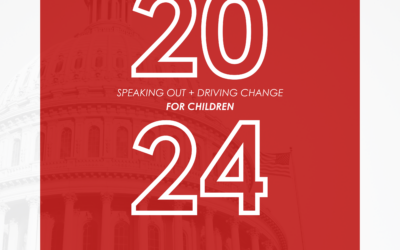
Over the last 140 days, Children at Risk monitored thousands of bills, registered support for bills 93 times, provided written testimony 23 times, and provided oral testimony 20 times. Out of our initial legislative priorities, 17 bills ultimately made it to the Governor’s desk.
With the dust settled on the regular 87th Texas Legislative Session, Children at Risk advocates dove into the details to highlight what legislation passed, where there were missed opportunities, and what it all means for Texas children. Download our full 87th Session Report via the button below.
Bill Highlights
It was a banner year for early childhood education policy. Several soon-to-be laws will raise the bar for quality in our state’s child care system.
- HB 2607 (Talarico et.al/Lucio) will require subsidy providers to participate in the state’s previously voluntary quality rating and improvement system, Texas Rising Star. With an appropriate phase-in period and increased access to supports and coaching, HB 2607 will improve the quality of care available to the more than 136,000 children currently enrolled in a subsidized program.
- HB 1792 (Button et al./Zaffirini) streamlines the evaluation of child care providers participating in the Texas Rising Star system.
- HB 619 (S.Thompson et al./Alvarado) requires TWC to collect additional data and develop a strategic plan to support a sustainable child care workforce.
- SB 1555 (Zaffirini/Raney), already signed by Governor Abbott, brings much needed financial relief to providers and incentivizes high-quality care by increasing state reimbursement rates.
This session also contributed to ending human trafficking and child exploitation.
- HB 390 (S.Thompson et al./Huffman) requires hotels and motels to train their employees on human trafficking prevention and reporting. The businesses must also post signs in areas visible to employees that provide reporting information.
- HB 1540 (S.Thompson et al./Huffman) is the Attorney General’s human trafficking omnibus bill. This bill provides extra protections for children in residential treatment centers. It increases the penalty for soliciting sex from a Class A misdemeanor on the first offense to a state jail felony, among several other anti-human trafficking provisions.
- HB 2633 (A. Johnson et al/Huffman) establishes a human trafficking grant program that provides resources for youth and young adult victims of human trafficking, including housing and long-term support.
- SB 315 (Huffman et al./Hunter et al.) prohibits sexually oriented businesses from employing individuals under 21.
Unfortunately, two bills that would have made youth safer were vetoed by Gov. Greg Abbott.
- SB 1109 (West/Anchia) would have required schools to educate students on dating violence and other forms of abuse. This bill would have been a step towards providing children with healthy relationship training to recognize grooming, coercion, and abuse.
- HB 2803 (S.Thompson/Huffman) would have allowed tenants to void their lease if their landlord is also leasing to an illicit massage business within the same commercial vicinity.
One bill will increase the well-being of families and prevent child abuse through improved data practices and evidence-based prevention programs.
- SB 452 (West/Rose) revises state standards for evidence-based prevention programs to ensure Texas provides the best possible programming and services to prevent child abuse or neglect.
There were four legislative wins related to children’s health & nutrition.
- HB 133 (Rose et al/Kolkhorst) extends the eligibility of mothers on Medicaid from two months to six months. While the original bill called for an extension of up to 12 months, this is still an improvement.
- HB 290 (Cortez et al./Kolkhorst), which prevents eligible children from mistakenly getting kicked off of Medicaid, rose from the dead and was amended to HB 2658 (Frank/Kolkhorst), which made its way to the Governor’s desk.
- DSHS is required to provide a biannual immunization report. For years that include the declaration of a public health disaster, SB 1353 (Miles/Guerra) will require this report to include information regarding the accessibility of vaccinations based on age, race, and location to determine disparities in immunization. The report must also estimate the economic benefits of reducing these disparities and include legislative recommendations to minimize them, leading to more equitable distribution of vaccines in a public health disaster.
- SB 224 (Perry et al./Walle et al.) simplifies the process of renewing SNAP benefits for those who are ages 60 and older. This will benefit the large number of Texas children who live with and/or are cared for by grandparents or elder relatives.
Pre-K-12 public education garnered less attention this session than previous sessions, but there were four important wins.
- SB 560 (Lucio/Guerra et al.) requires the state to develop a strategic plan to improve access to high-quality bilingual education.
- SB 179 (Lucio/Huberty et al.) ensures school counselors spend most of their workday supporting and counseling students and protects them from getting overburdened with administrative and other non-counseling-related tasks.
- HB 3643 (King et al/Taylor) establishes the Texas Commission on Virtual Education to develop and make recommendations on virtual education for public schools. The bill also provides for funding virtual education under the newly-established Foundation School Program.
- SB 2081 (Menéndez/Talarico) limits the size of public prekindergarten classes.
Texas missed opportunities to tackle systemic racism and address childhood racial disparities.
- SB 399 (Lucio) would have assessed state agencies’ efforts to reduce racial disparities via the Sunset Advisory Commission if passed and HB 710 (Coleman)/ SB 108 (West) would have given legislators a tool to evaluate the impact of pending legislation on childhood racial disparities if passed.
- Numerous bills were filed to reinstate and provide appropriate funding for the Office of Minority Health Statistics and Engagement. None made it far in the legislative process.
We hope to see Texas leaders make racial equity a greater priority in future sessions and make the jump from promises to legislative action. Texas will never reach its full economic potential unless ALL Texas children are equipped with the tools and resources they need to thrive.
Are you a Champion for Children?
For the 7.3 million children in Texas, you can be by giving a monthly recurring donation to Children at Risk.
MORE LIKE THIS
Press Conference: Education, Legislation, and Workforce Alignment in Texas
Changes to school funding, teacher certification requirements, and public education policy poised to reshape academic recovery and career preparation for Texas students. Media Contacts:Morgan Gerri, 832.600.9354Rashena Franklin, 713.301.4577...
State Senator César J. Blanco Passes Bill to Help Young Adults inWest Texas Get Back to School and Work
FOR IMMEDIATE RELEASE: Contact: Taylor Sanchez Taylor.sanchez@senate.texas.gov Austin, Texas – The Texas Senate has passed Senate Bill 1143, authored by Senator César J. Blanco, to help reconnect young adults in West Texas with education, job...
2024 Annual Report
Dear Friends and Advocates, At CHILDREN AT RISK, we believe that every child deserves a fair shot at success—and we know that it takes all of us to make that happen. Whether you’re a policymaker, educator, donor, volunteer, or advocate, your...
Connecting Across the Lone Star State: Reflections from CHILDREN AT RISK’s Spring 2025 Texas Tour
This spring, CHILDREN AT RISK’s early childhood team had the incredible opportunity to connect with our early learning family across Texas! While virtual tours may not physically transport us to the stunning beauty of an East Texas wildflower patch...
CHILDREN AT RISK Condemns Unlawful Deportation of U.S. Citizen Children
FOR IMMEDIATE RELEASE CHILDREN AT RISK Condemns Unlawful Deportation of U.S. Citizen Children and Urges Immediate Federal Action Houston, TX — CHILDREN AT RISK, a non-partisan research and advocacy nonprofit dedicated to improving the quality of...
Advocating in Support of H.B. 213
Mandi Kimball, Vice President & Chief Government Affairs Officer with CHILDREN AT RISK, testifies in support of H.B. 213 during the March 18, 2025 Texas House Committee on Public Education. HB 213 is a re-filed bill and passed this committee...



